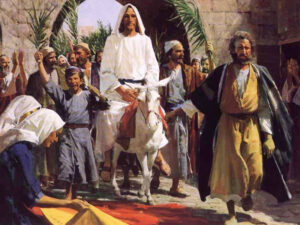This weekend Christians around the world will celebrate Palm Sunday, the day on which Jesus rode into Jerusalem declaring Himself to be the promised Messiah. His choice of a donkey for His mount not only fulfilled a prophecy Zechariah made hundreds of years earlier, but also underscored His kingship in the line of His royal ancestor David, who set his son Solomon on such an animal to announce his chosen successor.
The Gospel writers also tell us that many people sang praises to Jesus that day as they laid their coats on the ground and waved palm branches which also symbolized royalty. It was a time of high drama as crowds openly worshipped this great teacher and miracle worker. In many ways it was His Inauguration Day.
In the midst of the excitement and celebration, however, Jesus did something very odd. According to the meticulous historian Luke, Jesus began to weep while all the people worshipped. No US President has ever been observed weeping at his own inauguration. Why would Jesus do such a thing? 
Luke tells us that too. Jesus was not weeping for the pain and suffering He would endure that Friday, nor for the grief His mother and friends would face. Rather, Luke says, He wept over the impending destruction of Jerusalem which He could see coming less than forty years later at the hands of the brutal Roman army.
Luke records Jesus’ words at that moment as, “If you, even you, had only known on this day what would bring you peace — but now it is hidden from your eyes” (Luke 19:42). Their failure to recognize and obey God’s Son brought great disaster that could have been avoided had they done so. For although some of the people acknowledged His deity and lordship, most did not. Instead of directing the people toward the Messiah, their threatened leaders now led the charge for His crucifixion.
Although we live 2,000 years later, Jesus’ words that day still ring in our ears, amplified by the moisture of His tears. The only other time we see Jesus weeping is at the tomb of His friend Lazarus whom He later raises from the dead. His brokenhearted emotion on His Inauguration Day should command our attention and cause us to ask if we know what will bring us peace?
The Jewish leaders thought theirs would come by defeating Rome and forcing her to leave their borders. Others were determined to secure it through wealth and pleasure while still others sought it in obeying the multitude of man-made laws the Pharisees had piled on top of God’s. But these things could not and did not bring peace to them.
Today, in our fast paced world of work, family, sports, politics and all the rest, peace is just as elusive as it was then. Our busyness has caused it to become as rare as unicorns and, as my dad used to say, “As scarce as hen’s teeth.” Many times we chase finances believing that some magical level of income or savings will grant us security and safety. Others seek it in fame and popularity while still others attempt to seize it with power and control. Ironically, the very things we often pursue in order to acquire peace actually drive it farther from us. Our frantic efforts to collect and amass these commodities crowd out this precious gift that can only be experienced by becoming still and recognizing God.
Peace is not a goal to be attained, but rather God’s presence to be enjoyed. Knowing that our sins are forgiven and that Jesus will walk with us through every circumstance provides a calm contentment. This can be experienced in no other way except through simple faith in the Savior. Even the pain and separation of death is transformed into eternal life and glory through Jesus.
During these days leading up to Good Friday, quietly pause in God’s presence and invite His peace into your life. Meditate on the meaning of Jesus’ sacrificial death and on the power and importance of His resurrection that you might know the peace He desires for you and everyone else.
Blessings, George